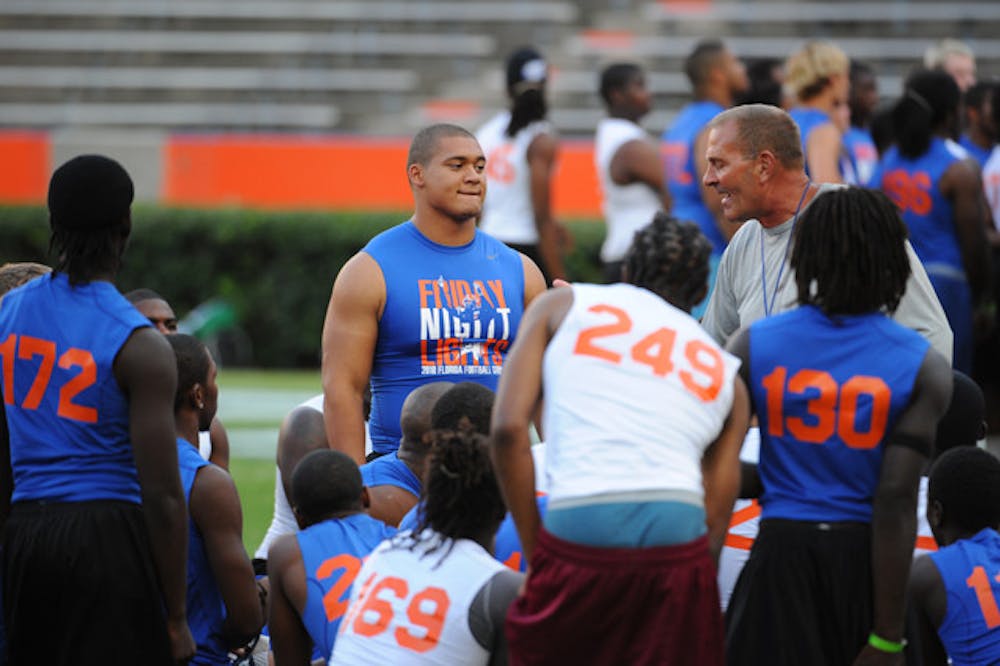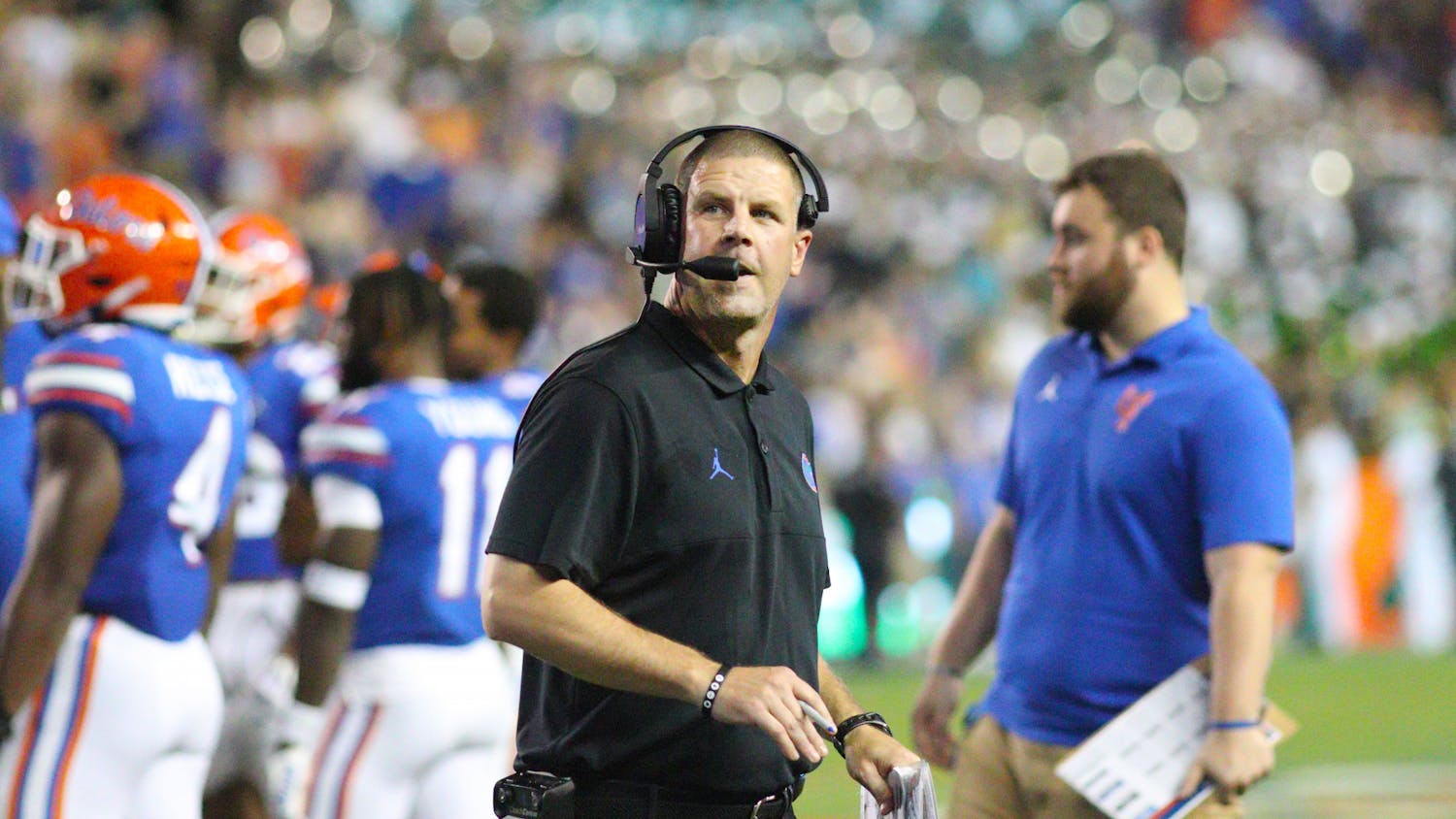Hunter Joyer’s decision to commit to Florida last June was an easy one.
Location played a pivotal role for the nation’s top-rated fullback, who lives in Wesley Chapel, about 25 miles northeast of Tampa.
His mother, Kristen, had an aneurysm last February, and distance was part of the reason Joyer recently transferred from Tampa Catholic High to Wesley Chapel High, where he spent his first two years of high school.
“It was scary, not knowing if I was going to lose her or not,” Joyer said. “It’s something I worried about a lot.”
Joyer was making a 45-minute trip to and from school each day. With his mom’s health condition, Joyer and his family could no longer commit the time and money it took for him to remain at Tampa Catholic.
“I wanted to be close to her,” Joyer said. “She’s getting back to normal. I guess she won’t be back to being 100 percent, but she’s doing pretty good.”
The opportunity to be a mere two hours away from home to play college football appealed to the former Tampa Catholic standout.
That was enough to make Joyer, Rivals.com’s No. 1 fullback, commit to Florida, a school that was always at the top of his list because of the academics and prestige of the football program.
“He’s such a grounded young man,” Crusaders coach Bob Henriquez said. “He’s fairly quiet, but on the field, he’s fiery. … Sometimes you don’t know whether something’s eating at him or bothering him, but it couldn’t be easy what he’s gone through.”
At Florida, Joyer would be able to easily travel home and check on his mom if anything were to happen.
Although fullbacks have been irrelevant at UF, Joyer thought he would see the field if he proved his worth to the coaches, so he stayed strong in his commitment.
And now, Joyer could find himself becoming a bigger player in the Gators’ offense than he ever imagined.
* * *
Joyer had his heart set on Florida ever since he was young. He would often visit the school and check out the stadium with his family.
When former Florida coach Urban Meyer told Joyer his potential role in the Gators’ offense, the decision became even clearer.
Henriquez, who coached Joyer as a junior and senior, said Meyer and his staff didn’t plan on recruiting a fullback with this year’s class — until they saw Joyer.
“They were so impressed with Hunter that they made the decision to offer him because they didn’t think there would be a fullback with his skill set next year,” Henriquez said.
Nevermind that Meyer’s spread-option offense rarely used a fullback, or that not once during Meyer’s tenure at Florida did he land a true fullback in one of his recruiting classes.
It didn’t matter to Joyer that none of the fullbacks on the Gators’ roster under Meyer had recorded more than one career carry
But when coaches offered Joyer a scholarship on June 16, he didn’t hesitate to accept, and he gave his oral commitment to UF the following day.
Joyer and Henriquez said Meyer told them he was trying to transition the offense into a more traditional one that included two-back sets because defenses were starting to catch up to the spread.
“[The coaches] wanted to use a fullback more than they actually were,” Joyer said. “They didn’t really know if any of the fullbacks they had could really run the ball. The offense was ready to have a fullback, and they wanted to change it around with [John] Brantley at quarterback.”
The two-time national title-winning coach sold Joyer on playing for Florida despite the lack of a role for the position in Meyer’s offense and the fact that many considered him an afterthought in the Gators’ recruiting class.
“I don’t have to be in the spotlight or be the main guy on the team,” Joyer said. “It doesn’t bother me at all.”
* * *
As a fullback, Joyer is used to being overlooked.
The top high school prospects at each position are normally four- and five-star recruits. But the nation’s No. 1 fullback this year is a three-star recruit for the first time since at least 2001, according to Rivals.com.
“Growing up, I wasn’t always the most athletic one on the field, so I had to get it done other ways,” Joyer said.
Joyer found fullback to be a natural fit, especially since his father, Jack, also played it. Joyer was always 30 to 40 pounds bigger than most kids his age, but not much taller, and couldn’t play many other positions. Offensive line wasn’t an option to him — he wanted the chance to touch the ball.
As a senior at Tampa Catholic, the 6-foot, 245-pound Joyer began the season as the Crusaders’ featured back because of the team’s youth at running back. He was a year removed from being the lead blocker for a 1,700-yard rusher, and his offense struggled early on when his role changed.
“He was willing to play more fullback to help the team, so he went back to that traditional role,” Henriquez said.
When Florida coach Will Muschamp took over for Meyer and said he would implement a pro-style offense, Joyer knew he would be one of the players to reap the benefits.
“I was really excited about that,” Joyer said. “I knew the offense would fit my style a lot better than it did before, so I thought it was even a better decision after they hired [Muschamp].”
When Muschamp later named former Notre Dame head coach and Kansas City Chiefs offensive coordinator Charlie Weis as the Gators’ offensive coordinator, Joyer knew he would have an opportunity to make an impact at Florida, even as a freshman.
On his official visit to UF in January, and during an in-school visit, Joyer sat down with Weis and discussed the role he will play in Florida’s offense when he signs his national letter of intent today, officially becoming a Gator.
“My future seems pretty strong,” Joyer said. “I won’t have to worry about not being used and not being on the field.”
* * *
Even after Meyer resigned in December, Joyer didn’t waver in his commitment to the school.
As long as Florida didn’t hire a coach who planned on running a five-wide-receiver offense, Joyer intended to keep his word. The chance to contribute was still there for Joyer when Muschamp and Weis were hired.
“He’ll be able to get on the field,” ESPN recruiting analyst Corey Long said. “The opportunity will definitely be there.”
During his only season with the Chiefs, Weis’ offense led the NFL in rushing yards (2,627) and was tied for fourth in yards per carry (4.7). Part of the credit for that goes to the fullbacks, who, despite not putting up many stats, were primarily used as lead blockers.
When Joyer met with Weis, the coach told Joyer he intends to use the fullback like he has in the past: as a lead blocker, goal-line back and receiver in the flats and out of play action.
Long thinks Joyer will be able to fill that role for Florida.
“He’ll grow into a nice prospect,” Long said. “He’s a good blocker and has some good receiving skills. He’s a decent runner and a tough kid. ... He’ll be a good blocking back.”
With a spot in the offense already mapped out, Weis told Joyer the chance to play early was there for him but to not feel pressured by it.
“I know I have a lot of work to get done,” Joyer said. “I need to work hard and impress the coaches and show them that I have what it takes to start. There’s always a possibility I can start, but I won’t guarantee anything.”
The Gators have two fullbacks on their roster with game experience: rising senior Steven Wilks and rising junior T.J. Pridemore, both of whom were converted from defense to fullback before coming to Florida.
Together, the two have played in 35 games and totaled zero career carries, contributing mostly on special teams.
Joyer, who bench presses at least 485 pounds, feels his body is mature enough to contribute right away in college. Henriquez described Joyer as a student of the game and thinks his skill set will transition well to the next level.
“He’s going to be an intricate part,” Long said. “He’ll be one of those blocking fullbacks that you definitely notice if he’s not in the game because the production of the offense goes down.”
After originally being an afterthought in the Gators’ 2011 recruiting class, Joyer’s decision to remain close to home and commit to Florida, despite the coaching change, helped put him in an unfamiliar spot for UF fullbacks: relevant.
“It seems like the situation played itself out for the better,” Joyer said.





